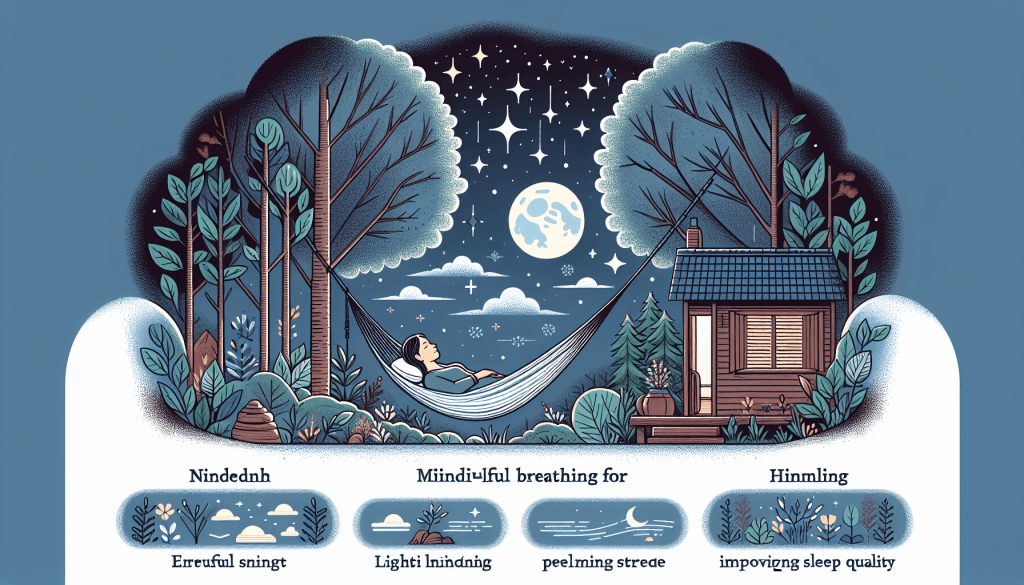If you’ve ever tossed and turned at night, you know how elusive sleep can be. Mindful breathing might just be the secret ingredient to improving your sleep quality. Imagine drifting into a peaceful slumber, leaving behind the day’s worries. Keep reading to discover how this simple practice can transform your nights and, ultimately, your days.
Key Takeaways
- Mindful breathing can significantly enhance sleep quality.
- It reduces anxiety and stress, promoting relaxation.
- Consistent practice improves sleep hygiene and patterns.
- Techniques range from basic to advanced, catering to all levels.
- Incorporating mindful breathing into daily life offers long-term benefits.
Introduction to Mindful Breathing and Sleep Quality
Definition of Mindful Breathing
Mindful breathing is the art of focusing on your breath, being aware of each inhale and exhale. It’s like giving your mind a mini-vacation, allowing it to rest and recharge. This practice is rooted in mindfulness, which encourages living in the present moment.
Importance of Sleep Quality
Sleep is not just a nightly ritual; it’s a vital component of our health. Quality sleep boosts mood, sharpens the mind, and strengthens the immune system. Without it, life can feel like trudging through mud.
Connection Between Mindfulness and Sleep
Mindfulness and sleep are like peanut butter and jelly—they complement each other beautifully. Mindfulness calms the mind, reducing the chatter that often keeps us awake. By practicing mindful breathing, you can create a serene environment conducive to sleep.

Benefits of Mindful Breathing for Sleep
Reduction of Anxiety and Stress
Techniques to Calm the Mind
Anxiety and stress are like uninvited guests at a sleepover. They keep you up, whispering worries into your ear. Mindful breathing techniques, such as deep breathing, can help shoo them away. By focusing on your breath, you can calm your mind and body, paving the way for restful sleep.
Impact on Relaxation and Sleep Onset
When your mind is at ease, relaxation follows like a gentle wave. Mindful breathing slows your heart rate and lowers blood pressure, making it easier to drift into sleep. It’s like pressing the “off” button on your brain’s chatterbox.
Improvement in Sleep Hygiene
Creating a Calming Bedtime Routine
A consistent bedtime routine signals your body that it’s time to wind down. Incorporating mindful breathing into this routine can enhance its effectiveness. Imagine dimming the lights, sipping herbal tea, and practicing a few minutes of mindful breathing—it’s a recipe for relaxation.
Consistency in Sleep Patterns
Regular practice of mindful breathing can help regulate your sleep patterns. It’s like setting your internal clock, ensuring you wake up refreshed and ready to tackle the day.

Techniques for Practicing Mindful Breathing
Basic Breathing Exercises
Deep Breathing Technique
Deep breathing is as simple as it sounds. Inhale deeply through your nose, hold for a few seconds, and exhale slowly through your mouth. This technique can be your go-to when stress creeps in.
4-7-8 Breathing Method
The 4-7-8 method is a bit like a magic spell for relaxation. Inhale for four seconds, hold for seven, and exhale for eight. It’s a powerful way to calm your nervous system and prepare for sleep.
Advanced Mindful Breathing Practices
Body Scan Meditation
Body scan meditation involves mentally scanning your body from head to toe, noticing any tension. It’s like giving yourself a mental massage, releasing stress and promoting relaxation.
Guided Breathing Sessions
Guided breathing sessions can be found online or through apps. These sessions provide step-by-step instructions, making it easy to practice mindful breathing even if you’re new to it.

Overcoming Sleep Challenges with Mindful Breathing
Addressing Bed Procrastination
Identifying Triggers
Bed procrastination is when you delay going to bed, even when you’re tired. Identifying triggers, such as screen time or caffeine, can help you address this habit.
Mindful Breathing as a Solution
Mindful breathing can be a powerful tool to combat bed procrastination. By practicing it before bed, you can create a sense of calm that encourages you to hit the hay.
Enhancing Self-Control for Better Sleep Habits
Role of Mindfulness in Self-Regulation
Mindfulness enhances self-control by increasing awareness of your habits. It’s like having a personal coach in your mind, guiding you toward healthier choices.
Strategies for Consistent Practice
Consistency is key to reaping the benefits of mindful breathing. Set aside time each day to practice, whether it’s in the morning, evening, or both. Over time, it will become a natural part of your routine.

Incorporating Mindful Breathing into Daily Life
Establishing a Routine
Morning and Evening Practices
Start your day with a few minutes of mindful breathing to set a positive tone. In the evening, use it to unwind and prepare for sleep. It’s like bookending your day with peace.
Integrating Breathing Exercises Throughout the Day
Mindful breathing isn’t just for bedtime. Use it throughout the day to manage stress and stay grounded. It’s like having a reset button for your mind.
Long-term Benefits for Emotional Wellness
Impact on Overall Well-being
Mindful breathing can improve emotional wellness by reducing stress and anxiety. It’s like a mental spa day, leaving you refreshed and rejuvenated.
Sustaining Improved Sleep Quality
By incorporating mindful breathing into your daily life, you can sustain improved sleep quality. It’s a long-term investment in your health and happiness.
Conclusion
Recap of Benefits
Mindful breathing offers a treasure trove of benefits, from reducing anxiety to improving sleep quality. It’s a simple practice with profound effects.
Encouragement to Practice Mindful Breathing
If you’re seeking better sleep, give mindful breathing a try. It’s a gentle, effective way to enhance your sleep and overall well-being.
Final Thoughts on Improving Sleep Quality Through Mindfulness
Incorporating mindful breathing into your life is like planting a seed of tranquility. With time and care, it will grow into a garden of restful nights and vibrant days. So, take a deep breath, and let the journey to better sleep begin.
For more insights on meditation techniques for better sleep or managing daily stress with mindful breathing, explore these resources. Additionally, learn about breath counting in mindfulness practices to deepen your understanding.
Unlocking Restful Nights: Your Mindful Breathing FAQ for Better Sleep Quality
What is mindful breathing and how does it relate to sleep quality?
Mindful breathing is a practice that involves focusing your attention on your breath, observing it without judgment. This technique can help calm the mind and body, reducing stress and anxiety, which are common barriers to a good night’s sleep.
How can mindful breathing improve my sleep?
Mindful breathing can improve sleep by activating the parasympathetic nervous system, which promotes relaxation. This can lower your heart rate and blood pressure, making it easier to fall asleep and stay asleep throughout the night.
What are some simple mindful breathing exercises I can try before bed?
One simple exercise is the 4-7-8 technique: inhale for 4 seconds, hold for 7 seconds, and exhale for 8 seconds. Another is the body scan, where you focus on each part of your body while breathing deeply, helping to release tension.
How long should I practice mindful breathing to see improvements in my sleep?
Consistency is key. Practicing mindful breathing for just 5 to 10 minutes each night before bed can lead to noticeable improvements in sleep quality over time. The more regularly you practice, the more effective it becomes.
Can mindful breathing help with insomnia?
Yes, mindful breathing can be a helpful tool for managing insomnia. By reducing stress and promoting relaxation, it can help break the cycle of anxiety and restlessness that often accompanies insomnia.
Is there a specific time of day that is best for practicing mindful breathing to aid sleep?
While mindful breathing can be beneficial at any time, practicing it in the evening or right before bed can be particularly effective in preparing your mind and body for sleep. It can also be useful if you wake up during the night and have trouble falling back asleep.
Are there any tools or apps that can assist with mindful breathing for better sleep?
Yes, there are several apps designed to guide you through mindful breathing exercises, such as Calm, Headspace, and Insight Timer. These apps offer guided sessions that can help you develop a regular practice.
Can children benefit from mindful breathing to improve their sleep?
Absolutely, children can benefit from mindful breathing as well. Simple breathing exercises can help them relax and unwind before bed, leading to better sleep. It’s a great way to teach them healthy habits early on.
What should I do if I find it difficult to focus on my breathing?
If you find it challenging to focus, try starting with shorter sessions and gradually increase the duration as you become more comfortable. You can also use a guided meditation or focus on counting your breaths to help maintain concentration.
Are there any other benefits of mindful breathing besides improving sleep?
Yes, mindful breathing offers numerous benefits beyond sleep improvement. It can enhance your overall mental health by reducing stress and anxiety, improve concentration and focus, and even boost your immune system by promoting relaxation.



